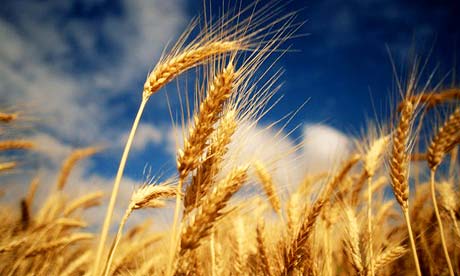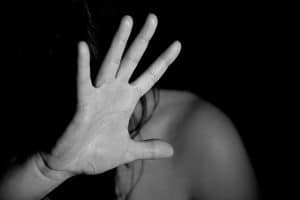by Melody
Cracked Wheat
father comes
quiet to
my room
at night,
tears away
sheets and
innocence.
mother makes
warm wheat
for breakfast,
new grain
broken before
water boils,
brown sugar
& butter
more than
eleven-year-old
should eat.
my tongue
tastes morning,
my mouth
holds seeds of truth:
harvest will come
for wheat
and tares.
The other morning I made cracked wheat for breakfast. I asked myself what it was I loved so much about this simple meal. It’s a favorite of mine. The answer unexpectedly overwhelmed me–
When I was a child and was being abused I often ate cracked wheat for breakfast. What I realized the other morning is that the grain itself bears witness of truth for “Truth shall spring out of the earth; and righteousness shall look down from heaven.” Psalms 85:11.
The Savior’s witness of all truth exists in each molecule of his creation. In the very moment of eating that wheat (unconsciously as a child and now consciously as an adult) I am reclaimed and healed by Christ’s atonement. I am the wheat. Cracked, broken. I am also a witness for His justice. Truth is in my mouth.
Ugo Betti said, “To believe [in god] is to know that all the rules are fair and that there will be wonderful surprises.” The poem is my personal expression of this idea.
Melody Newey earns a living as a registered nurse and lives to write. Her poems have appeared in Segullah, Utah Sings Vol VIII and Utah Voices 2012. She owns her history — the beautiful parts and not-so-beautiful parts. She writes about all of it.






17 Responses
This is beautiful. Thank you so much for being open enough to share it.
I have known a handful of abuse survivors in my adult like – some have done well and others have never been able to heal or move forward. I often wonder what the difference is. ??? Perhaps owning the past as is described above? I don’t know – and because it was not my experience – I do not form answers for others. I try to give all the compassion I have. Your posts has helped me see this issue more deeply. Thanks again for sharing
Thank you, Suzette. Your kind words make a difference for me and for anyone who has suffered this way. Your question is a good one. We are all so unique, it’s hard to know the answers.
My own belief is that one must re-visit and experience the array of emotions associated with a given trauma-not just as abstract ideas, but as visceral, human response to the event; work through the tangle of mental and spiritual contortions caused by such trauma; grieve and grieve and grieve the many losses — all with loving professional and personal support; and integrate the experience as part of one’s history. This brings the greatest peace and sense of wholeness. It’s not easy. And I suppose the process looks slightly different for each person. But this model is well-established for war veterans, rape victims, Holocaust survivors, etc. Most importantly for me: The presence of divine love and sustenance continues to underscore the entire process.
Again, each person is unique and must find her way to safety and wholeness however she can. So we do what we can and love each other along the way. Talking and writing about it helps. But some of us just can’t talk or write about it in a public forum. I’m hoping my sharing here will help others feel safe to do the same. We need each other.
Also, many survivors of traumatic events keep their story private and personal and live their lives doing good works. I honor and respect any person who has suffered heart-rending pain. I honor whatever way s/he chooses to live. I have kept my history relatively private for the past 25 years. Now it’s time to share and it’s right for me. It’s not right for everyone. I hope I made that clear.
Thanks, Melody, for waking us up. Your poetry is a gift and so are you.
You are a kind and generous soul, Twila. Thank you.
Thank you so much for sharing your lovely and heartbreaking poem. Thank you for speaking out, and opening the conversation.
In my youth, I was so consumed with my own experience (of pain, joy, life), that I thought that no one else could possibly understand what I was going through. As I’ve grown, and participated in others’ lives, I see how much we all experience.
The most constructive use of our time and energy is to share our weaknesses and strengths with each other. I’ve never thought about it like this before, but it’s almost like partaking more fully of the atonement, to share one another’s burdens. For when we place ourselves in someone else’s shoes, we can’t help but love them.
I’m teaching this poem today, which poses a similar dichotomy . . .
http://writersalmanac.publicradio.org/?date=2007%2F07%2F23
Perfectly put. Yes. We become more at one by sharing. Thank you. And the poem, Deborah. Thanks for the link. Perfect.
Just beautiful. And painful.
Beautiful. Thank you so much for sharing this, Melody. By speaking publicly of your experience, you help make it possible for others to likewise break their silence.
Thanks for this, it was really beautiful. I love that you find Christ in everyday things.
Thank you, Melody. My heart has been so heavy lately, hearing stories of overwhelmingly awful abuse in the news. Any abuse is overwhelmingly awful, and my heart just aches for the victims. It helps me to hear your thoughts. I don’t know if this is what you meant in the poem, but the last line about tares makes me think about justice. I hope there will be justice, as well as healing.
Yes, Emily. Wheat and tares: a beautiful scriptural imagery that affirms divine justice. We may not see it in this world, but God assures us this is part of the plan. I’m glad you saw that. It was indeed intended. This knowledge is an integral part of healing for me. It brings both freedom and comfort.
Thank you for this poem. The imagery of a young girl with nothing but sheets for protection reminds me of stories my mother, who is also a survivor of sexual abuse, has told me. I admire your bravery for telling your story publicly. I know there can be consequences. Some family members did not support my mom because she appeared on TV to talk about her abuse. They did not like her airing dirty laundry in public. But she believes that keeping abusers’ secrets facilitates abuse on our society. She thinks she may have been safer as a child if she had known it was okay to talk about abuse. I am glad that people like you and my mom are willing to speak out.
April, you probably already know that your mom’s experience with repercussion for “telling” is typical. And I completely agree with her: secrecy breads success for perpetrators and facilitates a sort of societal PTSD. [The ‘dirty laundry’ thing is very familiar to me. In fact, this evening I will be reading an essay I wrote about motherhood and abuse at “Listen To Your Mother” in Utah. The title of the peice is “Not About Laundry” and addresses the need for truth-telling in order to heal our wounds. Fortunately, I was blessed with siblings who, to varying degrees, were supportive of my work in shining light on the dark truth of our family. We still love and support each other.
Thank you for reading and commenting. All my love to your mom and to you.
This is so powerful, Melody. Thank you for sharing this with us.
Melody, I dont have words to express how much this moved me. Such beautiful yet painful imagery. Thank you for being willing to share.